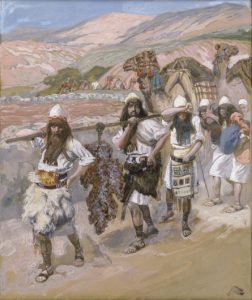When the Bible tells us about the famous story of the spies, who went to explore the land of Canaan, it uses some Hebrew names which are not very clear to the English reader. So today we will talk about some of the Hebrew names that appear in our weekly Torah portion:
“So they went up and spied out the land from the wilderness of Zin to Rehob, near Lebo-hamath.”

The Hebrew names that can be found in this verse are actually a geographical description of the borders of the land of Canaan from the south to the north.
In other words, the wilderness of Zin is a geographical area which can be found in the southern part of the Land of Canaan (the greater region of the city of Beersheba today) and according to the Jewish tradition it is called that because of the specific kind of palm tree that grows there (the name of the tree is Zin ).
The Hebrew name Rehob is not completely clear in this case and raises a couple of speculations. According to one theory, it is derived from the Hebrew root R-H-B (ר-ח-ב) which means wide and may refer to the width of the land. In Classic and Modern Hebrew the meaning of the word Rehov {רחוב} is the word for street.
The northernmost place mentioned in this verse is Lebo-hamath. This place was on the border between the land of Canaan and the ancient kingdom of Hammath, which is located in Lebanon and Syria of today.
The name Hammath is derived from the word H-O-M (ח-ו-מ) which means heat or warmth . The Hebrew word Hammah is another name for the sun. This geographical area – meaning the northern part of Israel, parts of Lebanon and southern Syria of today – is characterized by its hot springs, which are called Hammei {חמי} in Hebrew (and other Semitic languages).
In fact, lots of modern places in this region bear the name Hammah and one of the most well-known of them is Hammei Teveria {חמי טבריה} (Tiberias’s Hot Springs ).
Many of you have probably heard of the famous Turkish baths which are called in Turkish “Hammam”- another word that refers to hot springs and resembles the Hebrew word for heat – Ham {חם}.
